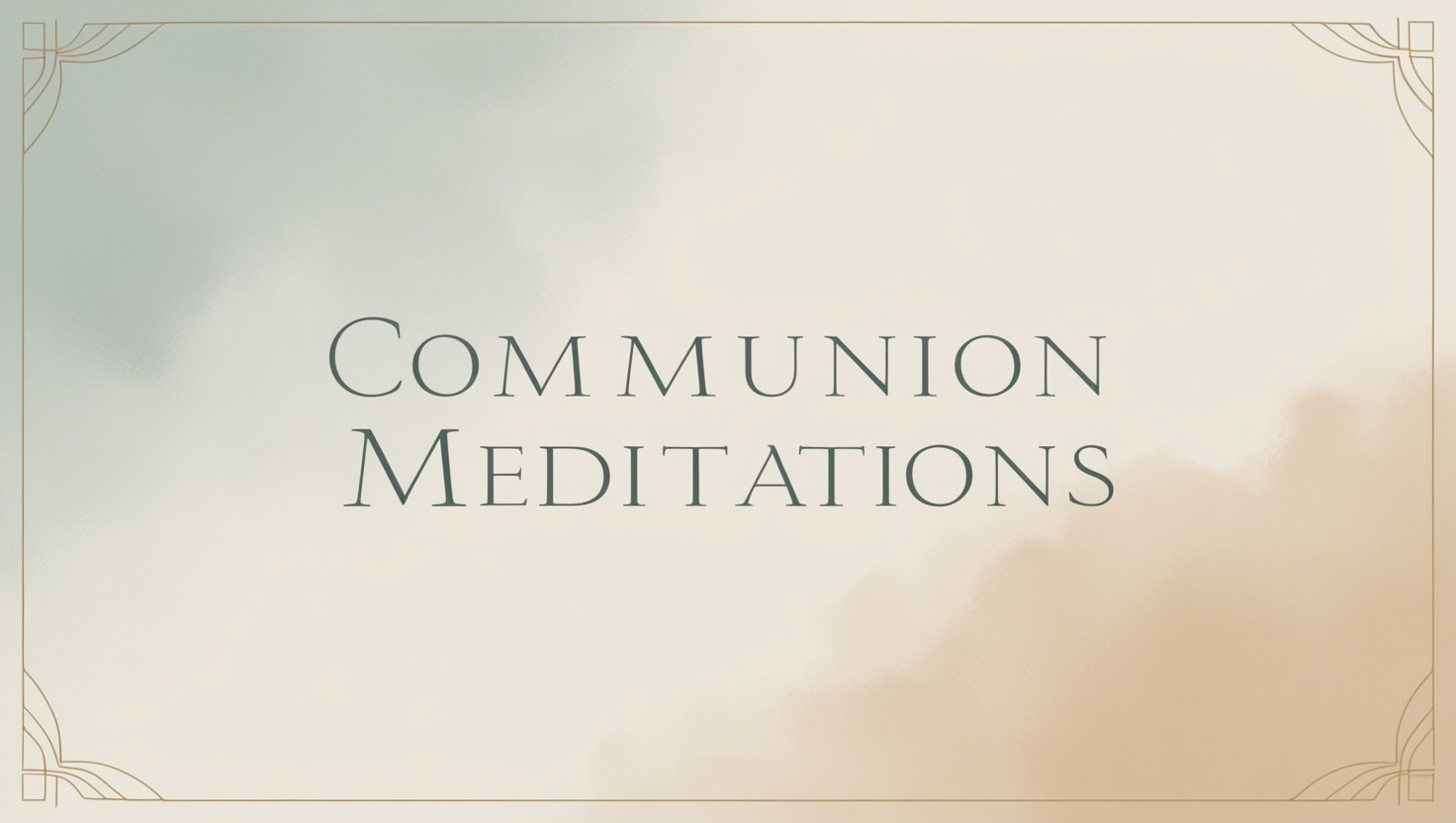Communion, referred to as the Eucharist or the Lord’s Supper, holds great significance as a sacred practice in Christianity. It symbolizes the body and blood of Jesus Christ, remembering His sacrifice for humanity. Many followers find that adding meditation to their routine can enrich their spiritual journey and strengthen their beliefs. This guide will delve into how communion meditations can enhance your relationship with God, give detailed guidance on effective meditation, and suggest specific ideas and prayers to enhance your communion experience.
Understanding Communion Meditations
Reflections during communion involve contemplative activities focused on the communion ritual. These reflections provide a moment for believers to pause and ponder, emphasizing the importance of Jesus’ sacrifice and the spiritual nourishment found in communion. By adding meditation to the communion ceremony, you can enhance the worship experience with deeper meaning and transformation.
Benefits of Communion Meditations:
- Improves spiritual awareness: Practicing meditation allows for increased presence and mindfulness during prayer, cultivating a stronger bond with God.
- Encourages mindfulness during worship by emphasizing the components of communion to foster a feeling of respect and appreciation.
- Reflecting on the significance of communion can enhance your personal faith and dedication to following Jesus.
Preparing for Communion Meditations
Before beginning communion reflections, it is crucial to get both your surroundings and your thoughts ready. Establishing a suitable environment and nurturing a tranquil and attentive attitude will improve your meditation practice.
Establishing the surroundings:
Select a quiet and comfortable space without distractions to sit comfortably.
Reduce interruptions: Power down your phone, lower the lights, and establish a calm environment to aid your concentration.
Preparation of the mind and soul:
Take a brief pause in quietness: Start by sitting calmly for a few minutes to calm your thoughts.
Pay attention to your breath: Inhale deeply and exhale slowly to relax your mind and get ready for meditation.
Required Materials:
Select appropriate biblical verses that address the importance of communion.
Reflections Notebook: Make sure to have a notebook available to write down any thoughts or insights that come up while meditating.

How to Practice Communion Meditations
Engaging in communion meditations entails following a set of steps that help you navigate the ritual of contemplation and supplication. By adhering to these instructions, you can generate a significant and life-changing encounter.
Step-by-Step Guide:
Start your meditation by first praying for God’s presence and guidance. Just a straightforward prayer, such as “Lord, please lead my mind and assist me in bonding with You while I meditate,” can establish the mood for your contemplation.
Read the Bible: Choose a fitting passage and read it to understand the significance of communion. 1 Corinthians 11:23-26 gives an account of Jesus’ words at the Last Supper, serving as a strong reminder of His sacrifice.
Think about the Bible verses you have read for a few moments. Consider its importance and how it connects to your personal spiritual path.
Reflect on: Concentrate on certain elements of communion and their meanings. Think about how the bread symbolizes the body of Christ and the wine represents His blood, reflecting on the deep significance of these symbols.
Conclude your meditation with a prayer expressing thankfulness and contemplation. Give thanks for His sacrifice and seek His guidance and presence in your life.
Short Communion Meditation Ideas:
Integrating brief communion reflections into your routine can offer swift and impactful opportunities for contemplation and bonding with God. Here are some suggestions for communion meditations that can be done in 2 or 5 minutes:
2 Minute Communion Meditations:
Show appreciation for Jesus’ sacrifice by reflecting on it and expressing gratitude. Consider the love and kindness that motivated Him to go to the cross and the way His selfless act has changed your life.
Unity in Christ: Reflect on the bond that believers share with Christ through the act of communion. Think about the way communion represents.Reflect on how the act of communion symbolizes being one with Him and with the body of believers.
5 Minute Communion Meditations:
Forgive: Concentrate on the forgiveness given by Christ’s sacrifice. Reflect on the liberation and tranquility that result from understanding you have been pardoned and purified from wrongdoing.
Find solace in Christ: Reflect on the hope bestowed through the resurrection of Jesus. Consider the guarantee of endless life and the confidence that, in Christ, everything is regenerated.
Communion Meditation and Prayer:
The spiritual depth of your practice can be heightened by incorporating meditation and prayer during communion. Although meditation involves reflecting and contemplating, prayer allows for communication with God and seeking His guidance and presence.
Importance of Combining Meditation and Prayer:
Improved Connection with God: Meditation readies the mind and heart, fostering a stronger bond with God in prayer.
Intentional focus: Prayer is enhanced when it follows deep meditation, as it embodies the wisdom and contemplation obtained during meditation.
Sample Prayer:
“Lord, as I partake of this bread and cup, I recollect Your sacrifice.” Assist me in mirroring Your love and grace in my life. “So be it.”
Making your own prayers:
Think about personal experiences: Think about how your life and experiences connect to the themes of communion.
Use passages from the Bible that align with your thoughts to help direct your prayers.
Communion Meditation on Hope:
Hope plays a significant role in Christianity, represented by the resurrection of Jesus and the assurance of everlasting life. Reflecting on hope while participating in communion can offer support and resilience, particularly in difficult circumstances.
Biblical Basis for Hope:
Romans 15:13: “May God, who is the source of hope, fill you completely with joy and peace as you continue to trust in Him. This will allow you to overflow with hope through the strength of the Holy Spirit.”
In Hebrews 6:19, it states that our hope serves as a steady and reliable anchor for the soul. It goes into the holiest place beyond the veil.
Guide for Meditation:
Pick a verse about hope from the Bible: Opt for a selection such as Romans 15:13 or Hebrews 6:19.
Ponder the Hopeful Promise: Take time to consider the hope we possess in Christ and the certainty of everlasting life.
Personal Reflection: Consider how this hope relates to your own experiences and situation, and how it can offer support and motivation.
Closing prayer emphasizing the hope found in Jesus. For instance, “Lord, I am grateful for the hope that You provide me with. Assist me in finding daily strength in this hope. “So be it.”

Tips for Consistent Practice:
Continuing to regularly engage in communion meditations can assist in strengthening your belief and enriching your spiritual path. Here are a few suggestions to maintain your motivation and consistency:
Create a schedule.
Establish a consistent schedule: Pick out a designated time daily or weekly for your moments of communion reflection. Consistency plays a key role in forming a habit and makes it simpler to maintain dedication.
Utilize reminders: Set reminders on your phone or calendar to aid in recalling your meditation routine.
Keep your determination high.
Consider the Advantages: Continuously think about the spiritual advantages of meditation, like improved awareness and a stronger relationship with God.
Share your meditation practice experiences with a faith community or a trusted friend. Sharing your stories can offer motivation and responsibility.
Support from the community.
Join a spiritual growth and meditation-focused group. Belonging to a community can offer encouragement and drive.
Share and Exchange Practices: Share your meditation routines and reflections with others. Talking about your experiences can strengthen your comprehension and improve your skills.
Additional Resources:
If you want to delve deeper into communion meditations, here are more resources that offer valuable insights and guidance.
Books and essays.
“Meditations on the Lord’s Supper” by Richard L. Holland presents a series of reflections on the importance of communion and offers practical tips for integrating meditation into your daily routine.
Check out Christianity.com for more insights and inspiration regarding articles and resources on the subject.
References from the Bible:
1 Corinthians 11:23-26: “I received from the Lord and now share with you: Jesus, on the night he was betrayed, took bread, gave thanks, broke it, and said, ‘This is my body, given for you; do this in memory of me.’ Similarly, following the meal, he held the cup and said, ‘This cup represents the new agreement sealed with my blood; whenever you drink it, remember me.’ By partaking in this bread and cup, you are declaring the Lord’s death until his return.
In John 6:53-58, Jesus told them, “Truly, I say to you, unless you consume the flesh of the Son of Man and drink his blood, you do not have life within you. Those who consume my flesh and drink my blood will have eternal life and I will resurrect them on the final day. My body is actual nourishment and my blood is actual liquid refreshment. Whoever consumes my flesh and drinks my blood will stay connected to me, and I will remain connected to them. In the same way the Father sent me, and I live because of the Father, will the one who feeds on me live because of me. This bread descended from heaven. Your forefathers consumed manna and perished, but anyone who consumes this bread will experience eternal life.”
If you want to learn about stoicism you can click here:
Online Communities:
Join Christian meditation Facebook Groups to connect and share experiences with like-minded individuals.
Engage in discussions on religious websites’ forums to explore communion meditations and expand your viewpoints.
Integrating communion meditations can enhance faith and strengthen connection with God. Whether you participate in brief 2 minute communion reflections or longer sessions, the important thing is to concentrate on the importance of communion and form a connection with the divine.

Leave a Reply